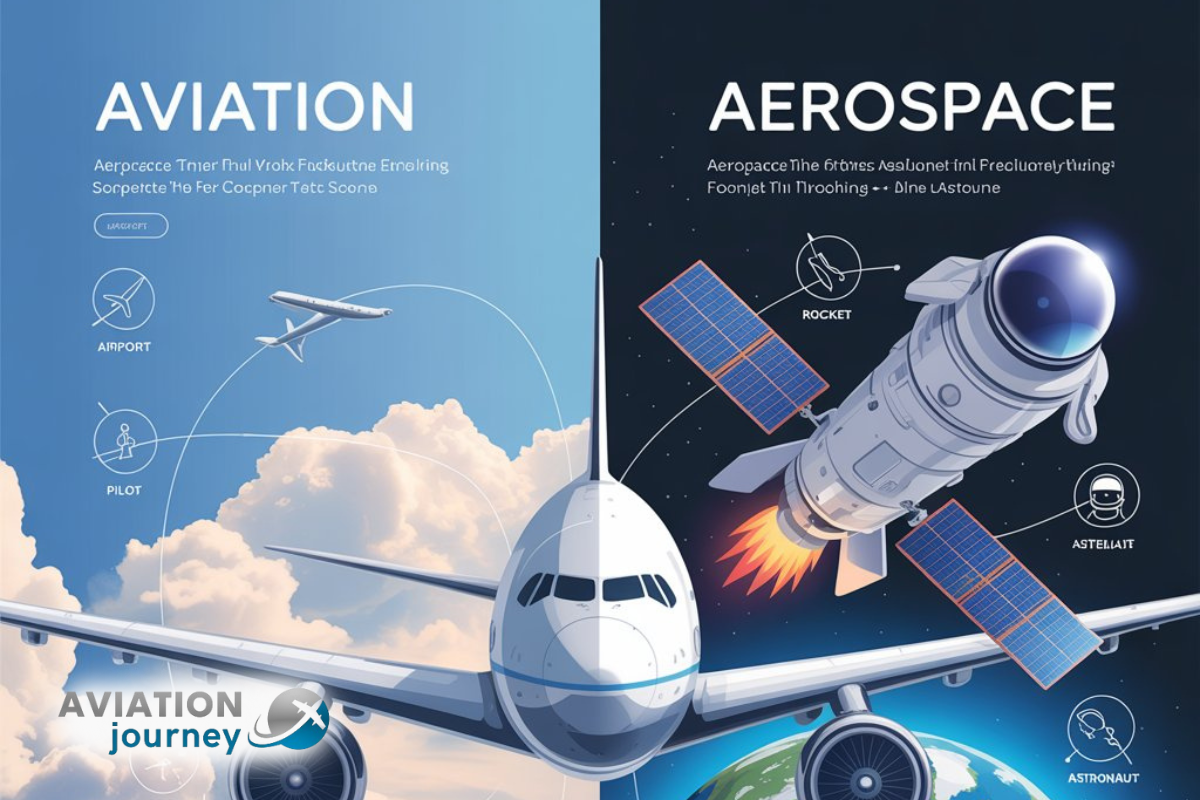Aerospace vs Aviation: The Key Differences in Simple Terms
Look up. More than 100,000 take offs and landings occur globally on a daily basis. Now imagine this: while some of those planes are carrying people from continent to continent, others—not nearly as many—are crossing the atmosphere of the Earth, bound for orbit. They’re both airborne. But they’re in two completely different worlds. That’s really the difference at the core of Aerospace vs Aviation—two companies sharing the same sky with very different destinations in mind.
Moreover, Aviation is the lifeblood of the skies. It’s what enables fly the plane you flew to that conference in February, the delivery van in at midnight with supplies, and even the rescue helicopter touching down in a storm. But aerospace? Aerospace creates. It’s developing hypersonic fighters, testing reusable rockets, and constructing satellites orbiting miles beyond our vision. One keeps us all connected on Earth. The other wonders, “What’s next?”
If you’ve ever wondered where these two fields split—and overlap—this primer will provide you with the insight you’re searching for. Also, if you’re a student charting your career, an engineer wanting to delve into your subdiscipline, or a naturally curious individual, this primer will break it down for you exactly how aerospace vs aviation differs—and why it’s important. Let’s begin.
Basic Aerospace vs Aviation Understanding
Aerospace: The Great Big World of Flight Things
Aerospace is sort of a big toy box that houses all things that fly – either where birds fly (which is aeronautics) or way high up where the stars are (which is astronautics). It has:Planes that fly hundreds of people
- Helicopters that rescue hikers lost in mountains
- Gigantic rockets that blast off into space
- Small satellites that allow us to watch television and learn about the weather
Aviation: The Process of Flying Planes
Aviation is like being the driver of all the planes. While aerospace builds the flying machines, aviation guarantees they’re airworthy to fly from point A to point B. Thus, it’s all about:
- Pilots who drive the big passenger planes
- Air traffic controllers who are like cross-country watchmen for the airspace
- Mechanics who do check-ups on aircraft to get them in tip-top shape
Aerospace vs Aviation: What They Do
Aerospace Careers: Building Future Flyers
Rocket Scientists: These bright people design rockets for space that look like giant pencils
Satellite Doctors: They fix equipment in space that allows your phone to have GPS function
Space Explorers (Astronauts): The lucky ones who get to float around in space and conduct experiments
Aviation Careers: Keeping Planes Afloat
Airplane Captains: They look neat in their uniforms and all are familiar with the flight deck buttons
Flight Teachers: They teach novice pilots how to fly airplanes
Airplane Mechanics: They use massive machines to make airplanes safe and flight-ready
Cool Machines in Every Universe
Aerospace Wonders
SpaceX Bouncy Rockets: Pogo stick-like rockets that bounce back to the Earth!
Super Speed Jets: Planes that take only 2 hours to fly from New York to London
Mars Helicopters: Tiny flying robots that fly to other worlds
Aviation Wonders
Double-Decker Planes: Airbus A380 holds 800 people – that’s like 8 school buses in the sky!
Flying Hospitals: Special planes that have operating rooms onboard
Crop Dusters: Colorful airplanes that help farmers grow our food
Which One Would You Choose?
Choose Aerospace If:
You like building with Legos and taking things apart
Want to know how rockets travel to the moon
You enjoy math and science puzzles for the brain
Select Aviation If:
You dream of flying to other nations
Like playing flight simulator games
Want to wear a pilot’s hat and shades

Conclusion
As of now, it must be clear: although aerospace and aviation are two highly related fields, they are incredibly different in their missions. Aerospace is the thinker—the inventor, designer, dreamer opening space doors. Aviation is the doer—the skilled professional getting all this to fly safely and reliably through Earth’s skies.
Whether a rocket flies to Mars or a jet liner flies across the Atlantic, both worlds matter. One is committed to designing what will fly; the other makes those machines glide through the air smoothly, safely, and mission.
So if you’re envisioning constructing satellites, traveling to other planets, or developing novel aircraft technology—then aerospace is the future. And if you’re passionate about flying aircraft, managing flight systems, or maintaining aircraft in their best form—then aviation is your vocation.
Both are eventually key to the transport, exploration, and communication of the future. The sky (and space) isn’t the limit—it’s just the start.
Frequently Asked Questions(FAQs)
Q1.How is aerospace different from aviation?
Ans: Aerospace is a broad term that includes both aircraft that operate within Earth’s atmosphere (aviation) and spacecraft that operate outside the atmosphere (astronautics).
Q2.Is aerospace aviation?
Ans: No. Aviation is a branch of aerospace, but aerospace covers other fields beyond aviation, such as space exploration, satellite technology, and missile systems.
Q3.Is Boeing aviation or aerospace?
Ans: It is an aerospace company that deals with different industries, including aviation (designing and manufacturing commercial aircrafts) and aerospace (manufacturing military airplanes, satellites, and spacecraft).
Q4.Why are there three types of aviation?
Ans:1.Commercial Aviation – Airline flights that carry passengers and freight.
2.General Aviation – Private flying, pleasure flying, flight training, and small aircraft not flown by airlines.
3.Military Aviation – Military aircraft for defense, transport, war, and reconnaissance.
Final Thoughts
Now you understand that aerospace is such an inventor who makes all the machines fly and aviation is such a pilot who pilots them in the best possible way. Both help us in amazing ways.

